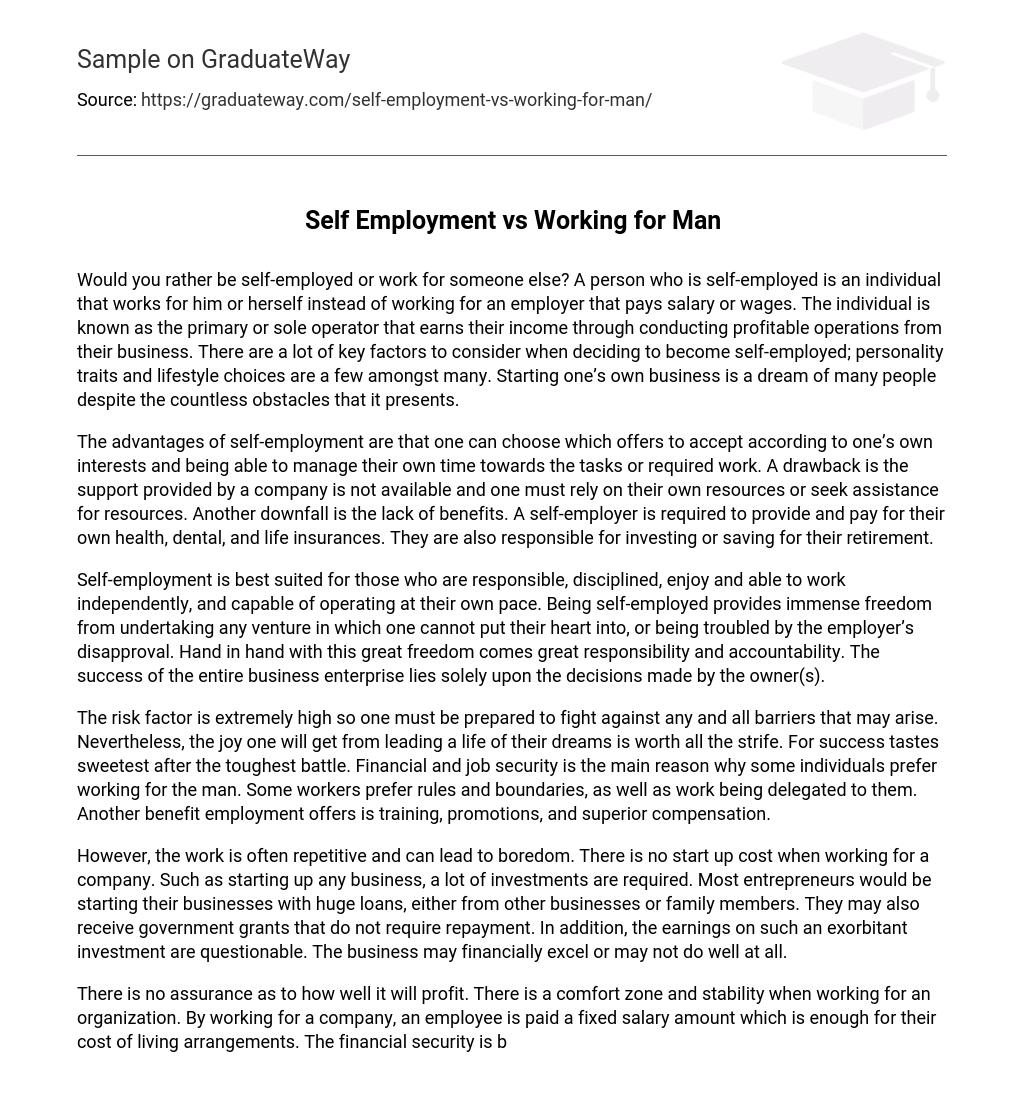When deciding between self-employment and working for someone else, there are multiple factors to think about. Self-employed individuals work for themselves instead of getting paid by an employer. They are responsible for managing their own business and making money through successful operations. Personal characteristics and lifestyle preferences strongly influence the decision to pursue self-employment. Despite the difficulties involved, starting a personal business is a common aspiration.
Self-employment offers advantages such as the ability to choose opportunities based on personal interests and the freedom to control one’s own schedule. However, it can also present challenges due to the absence of company support. Thus, self-employed individuals must rely on personal resources or seek external help when needed. Furthermore, they bear the responsibility of procuring and financing their own health, dental, and life insurance coverage, along with saving for retirement.
Self-employment appeals to those who prioritize responsibility, discipline, and independent work. It grants them the freedom to pursue their interests without fear of disapproval from employers. However, this freedom also brings substantial accountability as the success of the business relies solely on the owner(s)’ decisions.
Although the risk factor is high, individuals should be prepared to overcome obstacles in order to live their dream life. The satisfaction of achieving success after a challenging struggle makes it all worthwhile. For certain individuals, working for someone else offers financial and job security, as well as other benefits such as having rules, boundaries, and assigned tasks. Employment also provides opportunities for training, career growth, and higher pay.
Working for a company does not require a start-up cost, unlike starting a business. Starting a business often requires significant investments, which entrepreneurs might obtain through loans or grants. However, the returns on such investments are uncertain; the business may thrive financially or struggle.
Although profitability cannot be guaranteed, working for a company provides a feeling of reassurance and steadiness. This is due to the fact that employees receive a reliable salary that covers their living costs, ensuring financial stability even during challenging periods for the organization. However, layoffs may occur in times of economic decline or when cost-saving actions are required.
While owning a business is less likely, workers have alternative choices like changing departments, reducing hours, or switching companies. Conversely, self-employed individuals must determine whether to downsize or shut down their struggling businesses. Opting for closure will result in substantial financial losses for the owners. Therefore, self-employment may not be appropriate for everyone.
Opinions on the safety and risk of working for a company vary. Many people view it as a secure option with better benefits, while others disagree. The potential for financial loss and negative outcomes shapes these differing perspectives.
Running an underperforming business that fails to yield satisfactory returns can cause mental strain and stress, but this is less common when employed by a company. Inadequate business operations can have severe consequences, impacting one’s personal and family life negatively. Some individuals who lose all their money in a business venture may resort to unhealthy practices like gambling or more harmful actions in search of funds. To cope with this stress, they may turn to drinking or other vices.
In contrast, when working for a company, an individual’s irresponsible behavior, lackluster work ethic, or lack of ambition can result in the loss of all their money. Working for a company also offers opportunities to interact with individuals from diverse backgrounds and various skill sets.
Working with diverse individuals provides the chance to gain knowledge about various customs, beliefs, and traditions. Being part of a diverse company enhances the workforce’s potential to make a positive impact on society and other organizations. Presently, diversity plays a pivotal role in the labor force. Undoubtedly, the decision to work for a company or be self-employed relies on financial status and mental well-being. Numerous individuals hold the belief that working for an organization is preferable to being self-employed.
There are individuals who favor self-employment over traditional employment, each having their own pros and cons. Achieving success can be done either independently or within a company. Personally, I give preference to self-employment due to the advantages it provides and the satisfaction it brings. Nonetheless, both choices hold validity based on one’s values, dedication, and accomplishments.





